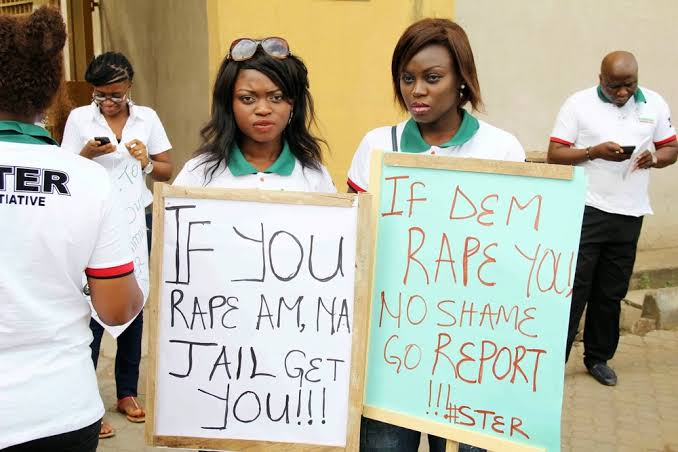An article on statutory rape laws in Nigeria, Defilement in Nigeria law, Age of consent in Nigeria, Punishment for rape victim in different countries, Attempted rape case in Nigeria, Solution/curbing the Rape crisis in Nigeria, the challenges of rape prosecution in Nigeria, reforming rape laws in Nigeria.
RAPE LAWS IN NIGERIA: ADDRESSING THE ISSUE OF RAPE AND KILLINGS OF THE GIRL CHILD IN NIGERIA
BY
OBANDE ADADU OGEBE
Introduction
In recent times, the issue of rape has been a reoccurring issue that is heard of almost on a weekly basis. Victims of rape are made to suffer unquantifiable anguish, some become post-traumatic stress disorder for some, dissociation from reality, depersonalization, endure physical violence, avoid social life, some even get infected with sexually transmitted infections, encounter serious difficulty in remembering events, relives moments of sexual assault and unwanted pregnancy amongst other ills.
This article seeks to address the issue of rape and killings of the girl child in Nigeria plus rape laws in Nigeria.
Who is a Girl-child?
A ‘girl-child’ as defined by Merriam Webster Dictionary is a ‘young female child’. The Child Rights Act defines a child to be any person under the age of 18. In as much as human rights are universal, civil, political, economic, social and cultural rights which belong to all human beings, including children and young people, the girl-child are particularly vulnerable to certain human rights violation especially rape.
Although, children and youths enjoy certain human rights specifically linked to their status as minors that need special care and protection, the girl-child still suffers vulnerability to certain human rights violations in as much as these laws are put in place. Such human rights of the girl-child are explicitly spelt out in the Convention on the Rights of the Child, which is the most widely ratified human rights treaty in history, African Children’s Charter, Child Rights Act, 2003 and a host of others.
What is Rape?
Rape in simple parlance can be said to be when sexual intercourse is not consensual or when sex occurs as a result of a person forcing another person against his or her will. In IDI V STATE, rape was defined thus:
“Rape in legal parlance means a forcible sexual intercourse with a girl or woman without her giving consent to it.”
In Nigeria, there are five (5) specific laws that deal with rape:
1. The Criminal Code – this is applicable in all the Southern States
2. The Penal Code – this is applicable in all the Northern States
3. The Criminal Laws of Lagos – this is applicable only in Lagos State
4. The Violence Against Persons Prohibition Act – this is applicable in only the FCT Abuja.
5. The Child Rights Act – this is only applicable in the States which have domesticated it
The Criminal Code of Nigeria: Under the Criminal Code (Section 357 & 358), rape is defined as:
“Any person who has unlawful carnal knowledge of a woman or girl, without her consent, or with her consent, if the consent is obtained by force or by means of threats or intimidation of any kind, or by fear of harm, or by means of false and fraudulent representation as to the nature of the act, or, in the case of a married woman, by personating her husband, is guilty of an offence which is called rape.”

Under the Criminal Code, sexual intercourse with under aged girls or people with unsound mind is the offence of defilement, and so technically a person could be charged for rape and defilement.
The Penal Code Act: The Penal Code explains rape in Section 282 as follows:
“A man is said to commit rape who, except in the case referred to in subsection (2) of this section, has sexual intercourse with a woman in any of the following circumstances:
(a) against her will;
(b) without her consent;
(c) with her consent, when her consent has been obtained by putting her in fear of death or of hurt;
(d) with her consent, when the man knows that he is not her husband and that her consent is given because she believes that he is another man to whom she is or believes herself to be lawfully married;
(e) with or without her consent, when she is under fourteen years of age or of unsound mind.”
Under the Penal Code which is applicable to Northern Nigeria, even where the girl who is the wife of a person, such person will be guilty of rape if she has not attained puberty.
The case of the former Governor of Zamfara State who was alleged to have married a 13 year old girl from Egypt comes in handy here. In such instance, if the girl has not attained puberty and he has carnal knowledge of her, he will be guilty of rape.
Criminal Laws of Lagos: Section 258 of the Criminal Laws of Lagos State explains rape to be:
“(1) Any man who has unlawful sexual intercourse with a woman or girl, without her consent, is guilty of the offence of rape and liable to imprisonment for life.
(2) A woman or girl does not consent to sexual intercourse if she submits to the act by reason of force, impersonation, threat or intimidation of any kind, fear of harm or false or fraudulent representation as to the nature of the act.
(3) Sexual intercourse between a man and a woman who are married is not unlawful.
(4) Sexual intercourse is complete on the slightest penetration of the vagina.”
In all three laws, rape can only occur when the vagina of the woman is penetrated. This was judicially held in NATASHA V. STATE, where it was held that:
“The most important and essential ingredient of the offence is penetration. The Court will deem that sexual intercourse is complete upon proof of penetration of the penis into the vagina. Any or even the slightest penetration will be sufficient to constitute the act of sexual intercourse.”
4. Violence Against Persons Prohibition Act: Under Section 1 of the Violence Against Persons Prohibition Act, a person commits the offence of rape if:
a. He or she intentionally penetrates the vagina, anus or mouth of another person with any other part of his or her body or anything else;
b.The other person does not consent to the penetration; or
c. The consent is obtained by force or means of threat or intimidation of any kind or by fear of harm or by means of false and fraudulent representation as to the nature of the act or the use of any substance or addictive capable of taking away the will of such person or in the case of a married person by impersonating his or her spouse.
5.Child Rights Act, 2003: The Child Rights Act provides that sex with a child is rape, and anyone who has sexual intercourse with a child is liable to imprisonment for life upon conviction.
At common law, rape is defined as an unlawful sexual intercourse with a woman against her will. The essential elements of the crime were sexual penetration, force and lack of consent. Also women who were raped were expected to have put up physical resistance at some point, otherwise the man would not be convicted of rape. It is no longer news that the Criminal Code and the Penal Codes codified to a large extent the common law position on the crime of rape in their various sections.
The severity of the offence of rape is one that cannot be overemphasized. In the case ofPopoola v State Per Muntaka-Coomasie J.S.C at page 120 paras G-H on rape said:
“the offence appeared to be heinous and heartless. The sentence meted out by the trial court amounts to abdicating its role as a judicial officer. I condemn such type of sentence. The sentence is unnecessarily lenient and loose”.
In the same vein, Per Ngwuta J.S.C AT PAGE 12, Paras D-E said:
“ I join my learned brother in expressing disappointment that the appellant was given a lenient term of five years in prison. I think that the severity of punishment for rape, with particular reference to statutory variety, should rank next to capital punishment”
Also inEdwin Ezigbo v. The Statewhere My Lord Justice Muhammed J.S.C had this to say:
“the facts revealed in this appeal are sordid and can lead to a conclusion that a man can turn into a barbaric animal. When the “criminal” was alleged to have committed the offence of rape, he was 32years. His two young victims: Ogechi Kelechi, 8 years old and Chioma, 6 years, were, by all standard underage. What did the appellant want to get out of these underage girls. Perhaps, the appellant forgot that by nature, children, generally, are like animals.
They follow anyone who offers them food. That was why the appellant, tactfully, induced the young girls with ice cream and zobo drinks in order to translate his hidden criminal intention to reality, damning the consequences. Honestly, for an adult man like the appellant to have carnal knowledge of underage girls such as the appellant’s victims is very callous and animalistic.
It is against the laws of all human beings and it is against God and the State. Such small girls and indeed all females of whatever age need to be protected against callous acts of criminally likeminded people of the appellant’s class.
I wish the punishment was heavy so as to serve as deterrent”. This shows how despicable rape can be.
The seriousness of the crime has made many nations across the globe enact and implement tough laws to curb the menace even as far as meting out the death sentence.
The Supreme Court of India awarded death penalty to the four men convicted of fatal gang rape of Jyoti Singh in December 2012, a case that fuelled global outcry and radically overhauled the country’s rape laws.
In Saudi Arabia, rape is punishable by death under circumstances of grievous and aggravated rape or in the case of serial rapists.
In Bangladesh, the Supreme Court in 2015 ruled in an appeal challenging the mandatory death penalty for rape. It said that death sentence will remain as an option alongside life imprisonment although depending on the gravity of the crime.
In Japan, 20 years is the penalty for rape. If it is fatal rape at the scene of any other crime like robbery, then death penalty applies.
In Iran, under Article 224 of the Islamic Penal Code, “fornication by force or reluctance is punishable by death”.
In Pakistan, gang rape, child molestation and rape are punishable by death. Statutory rape by a man of a girl under 16, especially gang rape, is also punishable by death.
And in Cuba, death penalty is the penalty for rape resulting in serious injury, especially by an offender previously convicted of the same crime or by an offender who knows that s/he suffers from a sexually transmitted disease. Rape of a child under the age of 12 is punishable by death.
Legal Requirement of “Penetration of the Vagina” In Rape Cases
In Nigeria, for the offence of rape to be properly established, there must be corroborative evidence which usually comes from eyewitnesses account or medical evidence. As regards eyewitnesses’ corroboration, the law requires that such witnesses must have witnessed the actual penetration of the victim’s vagina.
As was held in NATASHA V. STATE that the most important and essential ingredient of the offence of rape is penetration and even the slightest penetration will be sufficient to constitute the act of sexual intercourse.
In all jurisdictions of the world, the prosecution must prove that sexual penetration took place without the consent of the complainant. These are seen as the physical elements of the offence, or actus reus. In the common law jurisdictions, the prosecution must also prove that the accused knew that the victim was not consenting or was reckless about whether there was such consent.
This is known as the mental element of the offence, or mens rea. The meaning of unlawful carnal knowledge is expressly provided for in S.6 of the criminal code. Where it defines carnal knowledge as “carnal connection which takes place otherwise than between husband and wife.”
The section also further states that an important element of carnal knowledge or carnal connection is penetration. The slightest penetration of the vagina by the penis is sufficient. It is not necessary that the hymen was ruptured or there was ejaculation. Only a woman or girl may be raped as far as the wordings of the code are concerned.
Even though in recent times, there have been cases of men and boys claiming to be raped, the Criminal Code Act does not take cognizance of this fact (rape laws in Nigeria does not protect the male child). According to S.30 of the criminal code act, a male person under the age of 12 years is presumed to be incapable of having carnal knowledge.
This is an irrefutable presumption which means that he cannot be guilty of the offence of rape or attempted rape”, even if it is shown that he has reached puberty despite his age. He may however be convicted of indecent assault.
Since it is required that there must be genital penetration which a woman is incapable of doing, a woman would not be physically capable of committing the offence, but may be guilty of counselling or abetting rape.
Interestingly, although a woman may not be physically capable of committing rape against a man or another woman, she may however be charged and found guilty of the offence of rape.
This implication is deduced under S.7 of the Criminal Code which defines who a principal offender is. It provides that: “When an offense is committed, each of the following persons is deemed to have taken part in committing the offence and to be guilty of committing the offence and may be charged with actually committing it,
(a) Every person who actually does the act or makes the provision which constitutes the offence;
(b) Every person who does or omits to do an act for the purpose of enabling or aiding another person to commit the offence.
The fact that the law only recognizes vaginal penetration by a penis as rape has several negative implications. Firstly, the law centers women in its definition, ignoring male victims as can be seen in the Penal and Criminal Code thereby creating the impression that rape is a crime in which only a man can commit against a woman.
In the case of POSU V THE STATE, the Supreme Court held that it was the duty of the prosecution to prove the ingredients – the actus reus and mens rea of rape beyond reasonable doubt.
Hence, the prosecution must prove that the accused had non-consensual sexual intercourse, involving vaginal penetration with the victim. They must also prove that the accused intended to have sexual intercourse with the victim without her consent or acted recklessly by not caring whether the victim consented or not.
Also, in DPP V MORGAN, the court held that a defendant should be acquitted if he had a mistaken but honest belief of consent by the victim, even if belief in consent was unreasonable.
It is for the prosecution to prove that that the defendant did not honestly believe the victim was consenting. From proving the physical act of vaginal penetration to the state of mind of the accused, this burden is extremely onerous for the prosecution.
In ISA V KANO STATE, it was stated as regards the ingredients which the prosecution must prove to sustain the conviction of the offence of rape as follows Per Ogunbiyi, J.S.C. (Pp.11-12, Paras. E-C):
“The law is settled and well grounded that the prosecution has the burden and duty to prove the accused person guilty of the following ingredients in order to sustain the conviction of the offence of rape:
(a) that the accused had sexual intercourse with the prosecutrix;
(b) that the act of sexual intercourse was done without her consent or that the consent was obtained by fraud, force, threat, intimidation, deceit or impersonation;
(c) that the prosecutrix was not the wife of the accused;
(d) that the accused had the mensrea, the intention to have sexual intercourse with the prosecutrix without her consent or that the accused acted recklessly not caring whether the prosecutrix consented or not.
(e) that there was penetration. See Ogunbayo V. State (2007) 8 NWLR (Pt 1035) 157; Upahar v. State (2003) 6 NWLR (pt 816) 230; State V. Ojo (1980) 2 NCR 391; Okoyomon V. State (1973) 1 SC 21; State V. Anolue (1983) 1 NCR 71 and Iko V. State (2001) 14 NWLR (Pt.732) 221.”
International Instruments on Rape
As regards dignity of human persons, a lot of laws guide the affairs of individuals who have been violated in one way or the other. The 1999 constitution of the federal republic of Nigeria (as amended) as enshrined in Chapter IV provides for the protection of the dignity of individuals, it stated that every individual is entitled to respect for the dignity of his person and accordingly:
a. “No person shall be subjected to torture or to inhuman or degrading treatment,
b. No person shall be held in slavery or servitude and,
c. No person shall be required to perform forced or compulsory labour”.
The term human dignity became a relatively new concept at the end of World War II. Dignity of human person was prompted as a result of the acts of violence and genocide emanating from the war. The UN Declaration of Human Right provides that all human beings are born free and equal in dignity and rights.
The imputation of dignity on a person according to the court of appeal in UZOUKWU V EZEONU would include mental harassment and physical brutalization, while inhuman treatment typifies the lack of human sentiments, belittling of one’s societal status or character and the degradation of one’s value or position of a person.
As an underlying principle of international human right law, human dignity is linked to the values of autonomy and equality. For example, the Universal Declaration of Human Rights and International Covenant on Civil and Political right in their preamble stipulates that the recognition of dignity and equality is a foundation of freedom.
Rape as it is breaches the right to respect of a person as the person is treated inhumanly by refusing his/her choice of not having sex with the perpetrator is against all laws put in place to keep human dignity in check.
Reasons for the low Rate of Rape Prosecution Cases in Nigeria
The following are the reasons why the rape prosecution cases in Nigeria
1. The inability of rape victims to report:This is as a result of the fear of the stigma that may follow, shame or neglect. It is no longer news that rape victims in Nigeria are looked at as those who has dinned with the devil and constantly made a topic of discussion irrespective of them being present or not.
It ranges from openly mocking the victims to being neglected by close family members and friends. In some cultures, some are even seen as having brought shame and dishonor to the family in Nigeria.
The agencies put in place to help support such victims often times parade such victims to gain public sympathy and financial assistance from the public.
Statistically, the number of rape cases that has made it to the Supreme Court and the Court of Appeal are basically those of underage girls who do not usually understand the nature of the offence. Most adults would rather suffer in silence than to come out open so as to avoid public anguish and stigma.
2. No proper investigation by the appropriate authorities: A typical Nigerian police station will take the complaint of a rape case over the counter regardless of persons being there at that particular point in time. Aside delaying investigation or the lack of proper equipment’s both in human and material resources to effectively investigate rape cases, there is a lack of specialized training for police officers in handling these cases or in providing support for the victims.
Furthermore, forensic identification of suspects cannot be effectively carried out, the use of biological evidence such as blood, semen, saliva, vagina epithelial cells etc is totally lacking. Not to mention the monetary mobilization they usually ask for to fuel their vehicle or mobilization to put men and resources together to help them investigate properly.
3. No proper enforcement of legal sanctions: It is not enough to have sanctions put in place when an offense has been committed, it is also imperative to enforce this punishment in a very firm and decisive manner.
The police authorities should courageously investigate and recommend for prosecution the alleged offenders. The judiciary on the other hand should not shy away from handing out maximum punishment, when the occasion demands to sex offenders. This will serve as a deterrent to other members of the public.
4. The requirements to prove rape:In Nigeria, for the offence of rape to be properly established, there must be penetration and there must also be corroborative evidence which usually comes from eyewitnesses account or medical evidence.
As regards eyewitnesses’ corroboration, the law requires that such witnesses must have witnessed the actual penetration of the victim’s vagina. The possibility of this happening is very low. Most times, the act of rape is carried out in a place not easily accessible to members of the public.
Plus, when it comes to the issue of penetration, the court is concerned with whether the penis got into the vagina at any point. Modern realities have shown that penetration does not only have to do with the vagina for it to be rape.
On most occasions, before any person would get to the scene of the crime, the offender would have disengaged from the victim which ultimately means that rape as a criminal offence cannot be established but a lesser offence of attempted rape.
Ways in which the Menace of Rape can be curbed
1. Parents should strictly monitor their children and be mindful of those they are left to be under, be it with friends, relatives or guardians.
2. Parents should ensure they keep an open discussion regularly with their children and also create room for their children to be able to talk to them as no child will want to have a conversation with a parent who doesn’t usually create room for any sensitive matter such as rape.
3. The Legislature should ensure that the laws put in place for rape be revisited as most of them go as back as 1960 and were copied from the common law. The laws put in place do not create room for rape of the male gender. Forensic examination seem to be scarce in our country Nigeria. Medical evidence must be encouraged once a victim reports at a hospital or police station.
4. Forensic examination resources and personnel such as rape kits, voice analysis, facial recognition systems, handwriting analysis and fingerprints impression should be made readily available and immediate response be given to individual cases as rape is a very sensitive matter that should be given urgent attention. Traces of DNA from blood, hair, skin, saliva, semen, teeth bite can be quickly obtained to aid corroborative evidence.
5. The length of trial of rape cases should be abridged to enable victims to be able to recount the assault experience with very slight or no variation while giving evidence.
6. Procedural tests should be carried out to diagnose infections that may have been contracted
7. To reduce social stigma, the victims of rape should be accorded secrecy through giving recorded evidence or taking evidence away from open court. Rape laws in Nigeria should protect the victims rather than apportioning blame.
8. Proper education on the extant rape laws in Nigeria.
Conclusion
Rape is like cancer, it has no respect for age, sex or race. It starts from a spot and then gradually spreads to the entire body system. While spreading, it steals a victims’s pleasurable desires, purposeful drive and prospective dreams and in many cases, life.
It causes one to start questioning their beliefs and reasons for existence. Rape is condemnable, it is an unjustifiable act in our society and it is, finally, time that we rise as a nation to condemn and eradicate this despicable act. The fight against rape cannot be left only for the government to curb alone.
For it is better to avoid a problem than to look for a solution. Everyone should be enlightened about the ills of rape in the society as everyone has a relative that is a child. Legislative reform on the extant rape laws in Nigeria is the only mechanism available to respond to problems arising from the ills of rape in our society.
The rich provisions of the fundamental human rights as enshrined in the Constitution of the Federal Republic of Nigeria, 1999 (as amended) promises a beautiful future for women/girls but only if the government fulfills its obligations.
In light of the current realities, government should redeem its image and show its commitment by passing a bill on violence against the girl-child. The rape laws in Nigeria are still very ambiguous and at best archaic, they should be reviewed and made clearer.
Finally, rape laws in Nigeria should not be biased towards a particular gender, the male gender should also be protected against rape. Well, the billl to redefine rape to accommodate present realities and strengthen the rape laws in Nigeria has passed second reading in the senate is sponsored by Oluremi Tinubu (Lagos).

Sources:
1. https://www.merriam-webster.com/dictionary/girl-child
2. The Child Rights Act, 2003.
3. (2017) LPELR-42587 (SC)
4. (2017) LPELR-42359(SC)
5. https://lawpadi.com/laws-rape-every-nigerian-know/
6. (2013) 17 NWLR (Pt 1382) P. 100
7. (2012) 16 NWLR Pt 1326
10. Adeyemi Ijalaiye , „Sexual Offences in Nigeria‟ Nigerian Interfaculty Law Journal, (1991), volume 2 page 1
11. 2011. SC.134/2010.
12. UKHL 3, AC 182, 2 WLR 913, 2 All ER 347
13. (2016) LPELR-40011(SC)
14. (1991) 6 NWLR (pt. 200) 708 at 764-778
15. Kaufmann Peterson, Kuch Holman and Christie Neuhaeuser, „Humiliation Degradation, Dehumanization‟ Library of Ethics and Applied Philosophy, (2011), volume 2 http://www.springer.com/series/6230.
























